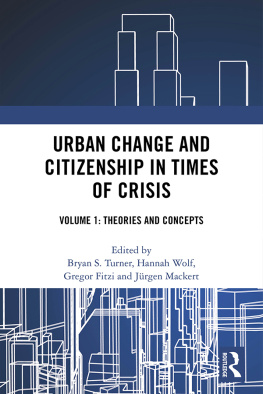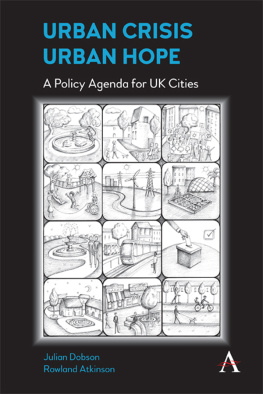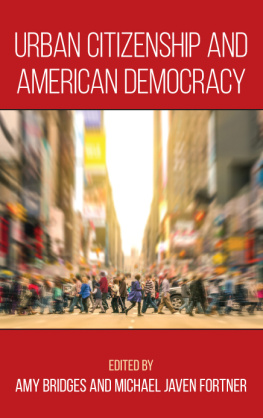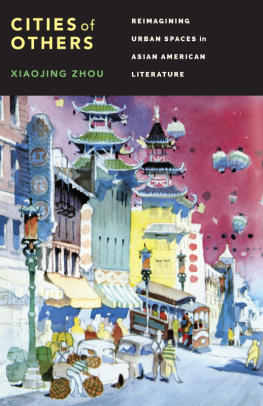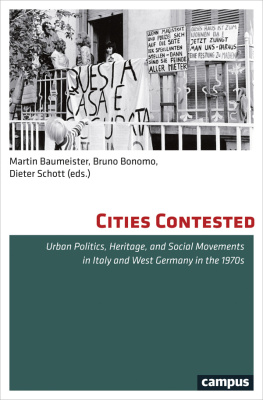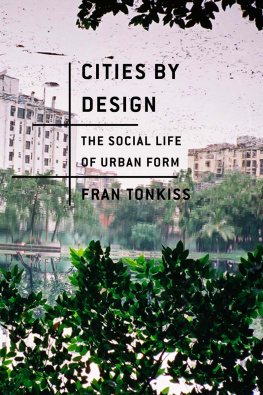What makes a good city? How may the quality of cities be characterized and defined? For years Ive been wondering why these questions are not on the agenda. This volume covers, for the first time, theoretical, historical and political aspects in an attempt to scrutinize the basis of a successful city. Innovative approaches combine issues of quality with the concern for collectivity under conditions of social change. This book is an essential read for sociologists, and students and scholars with a focus on urban studies, urban policies, planning or design studies.
Martina Lw, Professor of Planning and Architecture, Institute of Sociology, Technical University Berlin, Germany
Never has it been more important to explore the nature of urban change and related issues of social and environmental justice. [] Through the lens of multiple identities, social fragmentation, and fragile institutions the authors, individually and collectively, demonstrate that urbanisation may advance certain freedoms while simultaneously impinging adversely on established civil and political rights. [] Urbanisation is essentially an uneven process, spatially and temporally, and the chapters capture these divergent trajectories across different cultures. Whether these Times of Crisis are greater than other times the reader must be the judge. Either way, these are stimulating, challenging essays anchored in original research.
Richard Rodger, Emeritus Professor of Economic and Social History, University of Edinburgh, and Fellow of the Academy of Social Sciences, UK
Urban Change and Citizenship in Times of Crisis
Urban Change and Citizenship in Times of Crisis addresses the fact that in the beginning of the twenty-first century the majority of the worlds population is urbanised, a social fact that has turned cities more than ever into focal sites of social change. Multiple economic and political strategies, employed by a variety of individual and collective actors, on a number of scales, constitute cities as contested spaces that hold opportunities as well as restrictions for their inhabitants. While cities and urban spaces have long been of central concern for the social sciences, today, classical sociological questions about the city acquire new meaning: Can cities be spaces of emancipation, or does life in the modern city entail a corrosion of citizenship rights? Is the city the focus of societal transformation processes, or do urban environments lose importance in shaping social reality and economic relationships? Furthermore, new questions urgently need to be asked: What is the impact of different historical phenomena such as neo-liberal restructuring, financial and economic crises, or migration flows, as well as their respective counter-movements, on the structure of contemporary cities and on the citizenship rights of city inhabitants? The three volumes address such crucial questions thereby opening up new spaces of debate on both the city and new developments of urbanism.
The contributions to Theories and Concepts offer new theoretical reflections on the city in a philosophical and historical perspective as well as fresh empirical analyses of social life in urban contexts. Chapters not only critically revisit classical and modern philosophical considerations about the nature of cities but no less discuss normative philosophical reflections of urban life and the role of religion in historical processes of the emergence of cities. Composed around the question whether there can be such a thing as a successful city, this volume addresses issues of urban political subjectivities by considering the citys role in historical processes of emancipation, the fight for citizenship rights, and todays challenges and opportunities with regard to promoting social justice, integration, and diversity. Consequentially, theory-driven empirical analyses offer new insight into ways of solving problems in urban contexts and a genuine approach to analyse the Social Quality in cities.
Bryan S. Turner is Professor of Sociology and Director of the Institute for Religion Politics and Society at the Australian Catholic University, Honorary Professor and Director of the Centre for Citizenship, Social Pluralism and Religious Diversity at Potsdam University, Germany, and Emeritus Professor at the Graduate Center at the City University of New York City. He is the founding editor of the Journal of Classical Sociology. He edited the Blackwell Wiley Encyclopedia for Social Theory (2018). He was awarded a Doctor of Letters by Cambridge University in 2009 and received the Max Planck Award in social science in 2015.
Hannah Wolf is a researcher and lecturer completing her PhD at the University of Potsdam, coordinator of the Centre for Citizenship, Social Pluralism and Religious Diversity and associate member at the collaborative research centre Re-Figuration of Spaces (TU Berlin). Her academic background includes theatre and media studies, anthropology, philosophy and sociology. Her research interests lie in the political and moral economies of housing and home, citizenship, urban sociology and the sociology of everyday life.
Gregor Fitzi is co-director of the Centre for Citizenship, Social Pluralism and Religious Diversity at University of Potsdam, Germany. After his PhD in Sociology at the University of Bielefeld, he was Assistant Professor at the Institute of Sociology, University of Heidelberg, Germany. Among his recent publications are The Challenge of Modernity. Simmels Sociological Theory (Routledge, 2019) and Populism and the Crisis of Democracy, 3 vols, edited with Gregor Fitzi and Bryan S. Turner (Routledge, 2019).
Jrgen Mackert is Professor of Sociology and a co-director of the Centre for Citizenship, Social Pluralism and Religious Pluralism at the University of Potsdam, Germany. His research interests lie in the sociology of citizenship, political economy, closure theory, (neo-)liberalism, settler colonialism, and de-democratisation. His recent publication is Populism and the Crisis of Democracy, 3 vols, edited with Gregor Fitzi and Bryan S. Turner (Routledge, 2019).
Urban Change and Citizenship in Times of Crisis
Volume 1: Theories and Concepts
Edited by Bryan S. Turner, Hannah Wolf, Gregor Fitzi and Jrgen Mackert
First published 2020
by Routledge
2 Park Square, Milton Park, Abingdon, Oxon OX14 4RN
and by Routledge
52 Vanderbilt Avenue, New York, NY 10017
Routledge is an imprint of the Taylor & Francis Group, an informa business
2020 selection and editorial matter, Bryan S. Turner, Hannah Wolf, Gregor Fitzi and Jrgen Mackert; individual chapters, the contributors
The right of Bryan S. Turner, Hannah Wolf, Gregor Fitzi and Jrgen Mackert to be identified as the authors of the editorial matter, and of the authors for their individual chapters, has been asserted in accordance with sections 77 and 78 of the Copyright, Designs and Patents Act 1988.
All rights reserved. No part of this book may be reprinted or reproduced or utilised in any form or by any electronic, mechanical, or other means, now known or hereafter invented, including photocopying and recording, or in any information storage or retrieval system, without permission in writing from the publishers.
Trademark notice: Product or corporate names may be trademarks or registered trademarks, and are used only for identification and explanation without intent to infringe
British Library Cataloguing-in-Publication Data

